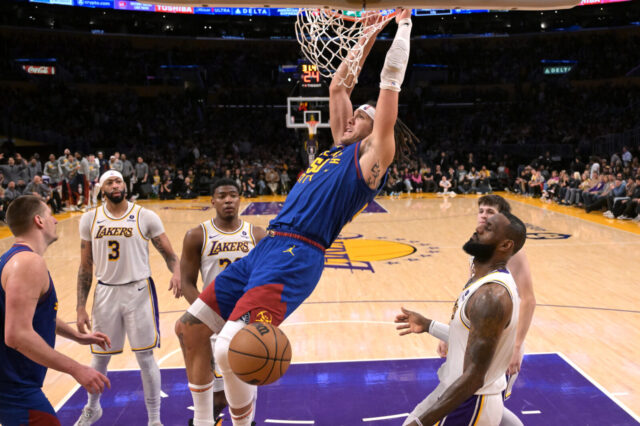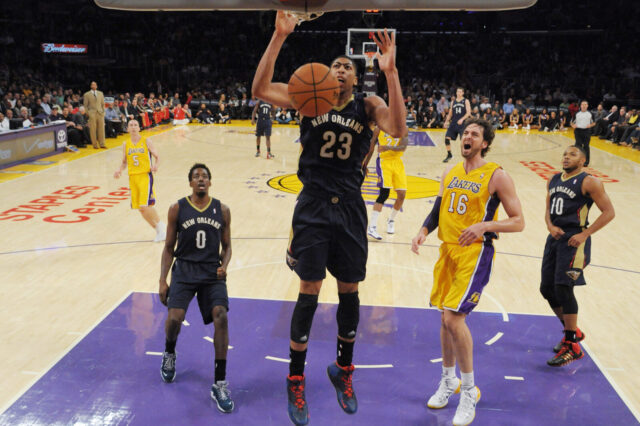LeBron James returning to his hometown Cleveland Cavaliers is a good thing for the NBA (assuming you can look past the fact that he is basically cherry-picking his way to another NBA title while screwing his aging teammates on the Miami Heat in the process). It makes a bold statement on behalf of small market NBA teams everywhere: with a little persistence and a lot of luck you, too, can contend with the likes of New York, Los Angeles, Chicago and Miami.
Diametrically opposite of Cleveland’s newfound fortune are the once-mighty Los Angeles Lakers who, just four years removed from a seventh championship appearance in an 11-year span, have about as barren a roster as you’ll find in the NBA. In the wake of James’ The Decision 2.0, the Lakers currently have just seven players on their roster. And one of them is Robert Sacre. Even Pau Gasol, whom I know firsthand loved living in Los Angeles, just bolted from Hollywood and Kobe Bryant to join forces with the Chicago Bulls.
The Cavaliers’ re-acquisition of James, the Lakers’ inability to sign a single marquee free agent, and everything in-between that has happened these past few weeks affects our Denver Nuggets in different ways, both positive and negative, and both near and long term.
For starters, most of the major transactions that have happened since late June’s NBA Draft through the first few weeks of free agency in July greatly benefitted the Eastern Conference, something the NBA desperately needed and certainly a positive for the Nuggets who reside in the brutally competitive Western Conference. Not only did Eastern-based teams score five of the first six picks in the lauded 2014 NBA Draft, but with James returning to Cleveland, followed by former Nugget Carmelo Anthony staying in New York, Chris Bosh bypassing the Houston Rockets to re-sign with Miami (along with, presumably, Luol Deng and Dwyane Wade), Paul Pierce choosing the Washington Wizards over the Los Angeles Clippers (joining a re-signed Marcin Gortat), Gasol signing with the Bulls, Kyle Lowry remaining with the Toronto Raptors and Minnesota Timberwolves star Kevin Love potentially joining James in Cleveland, the Eastern Conference is taking baby steps towards returning some competitive balance to the NBA.
Conversely, all of the above listed moves means that the Western Conference power balance probably remains in-tact as no Western-based team was able to make a major move. Acquisitions of note include the Oklahoma City Thunder’s signing of sharpshooter Anthony Morrow, the Phoenix Suns trade for Isaiah Thomas (because really, why have five point guards when you can have six?), the Clippers signing of Spencer Hawes, the Memphis Grizzlies‘ signing of Vince Carter, the Dallas Mavericks‘ signing of Chandler Parsons and re-acquisition of Tyson Chandler, and our own Nuggets’ re-acquisition of Arron Afflalo. But other than that – combined with the news that Tim Duncan, Dirk Nowitzki and Zach Randolph will remain in San Antonio, Dallas and Memphis, respectively – the Western Conference probably hasn’t changed much.
This is both good and bad for Denver.
By bringing Afflalo back, and drafting another two-guard in Gary Harris while also selecting the raw Bosnian big man Jusuf Nurkic (by the way, kudos to Nuggets GM Tim Connelly for drafting a foreigner with a short-spelled name – do you have any idea what a pain it is to write repeatedly about Efthimios Rentzias, Nikoloz Tskitishvili and Chukwudiebere Maduabum?), the Nuggets re-loaded in a way that should make them much more competitive in 2014-15 than they ever were in 2013-14 … especially if the roster is healthy, something head coach Brian Shaw said he expects during his NBATV interview during the team’s first summer league game:
"I expect every player on our roster to be healthy and ready on Day 1 of training camp."
And Shaw followed that up by acknowledging just how deep his Nuggets will be:
"[The Nuggets players] are going to have to get a lot done playing less time. Because we're two deep and three deep at some positions."
But even with the addition of Afflalo, renewed health and some fresh faces in Harris and Nurkic, who among the Western Conference’s eight 2014 playoff participants will our Nuggets leapfrog to get back into the playoffs? Could the Nuggets surpass Memphis? Dallas? Golden State? Portland? Unlikely. And that’s disregarding just how close the Suns and their impressive 48 wins came to making the 2014 playoffs themselves and the sure-to-be-improved New Orleans Pelicans as Anthony Davis‘ game continues to blossom.
Point being, even with the improved rosters of some Eastern Conference teams, the Western Conference remains talent rich and deep from teams one through 10. And if by chance Love stays in Minnesota, make that one through 11.
In the near term, the Nuggets best hope for cracking the West's top eight playoff seeds will rely on three things:
1) Shaw loosening up his system to run more. I recently spoke with an active NBA coach who told me that playing in Denver is so tough because the airport is far away from the city's core. He said if a team is playing the second of a back-to-back at Denver, it doesn't arrive until two or three o'clock in the morning and with the airport so far away, the team doesn't get to its hotel until three or four o'clock in the morning. By the time you're asleep it's five o'clock … and that's before the altitude kicks in. Shaw and the Nuggets must take advantage of this next season.
2) Health. One of the keys to former coach George Karl's Nuggets winning an NBA franchise-record 57 games just two years ago was that they were relatively healthy. This gave Karl the hammer of playing time if his many options of players didn't give it their all when on the court. If Shaw is correct in his statement above that players will "have to get a lot done playing less time", then the Nuggets' depth – combined with the altitude and travel advantage noted above – should make them one of the most exhausting road stops in the entire league.
3) Toughness. The Nuggets allowed too many opponents to push them around last season, especially in the paint. It's hard to imagine that a raw 19-year old rookie like Nurkic could suddenly make the entire team tougher, but perhaps it's a start. One of the many advantages Shaw will have with a roster that's 11 to 13 players deep will be fouls to spare. I strongly recommend they use them wisely, making Denver a miserable place to play for opposing teams.
In the long term, the moves that took place recently around the NBA might ultimately benefit Denver. As many NBA teams commit to giant salaries for aging or soon-to-be-aging stars (or in the cases of Gordon Hayward and Parsons, giant salaries for non-stars), the Nuggets don’t have a bad contract on the roster – save for perhaps JaVale McGee’s who, despite the $23 million owed to him through 2016, is still very trade-able. This gives the Nuggets ample flexibility to wheel-and-deal well into the future as they seek to improve their own roster. Clearly, the Nuggets learned the painful lesson from handing out $92 million to Kenyon Martin 10 years ago … a move that crippled the Nuggets ability to improve their roster for the duration of K-Mart’s seven-year deal.
So while James' return to Cleveland – and the subsequent dominoes that fell soon thereafter in NBA free agency – is a net positive for the NBA, it's also a net positive for our Denver Nuggets. The perennially pathetic Eastern Conference is slowly improving, while the Western Conference as a whole didn't get any tougher this summer.
At least, not yet.


